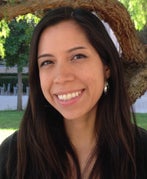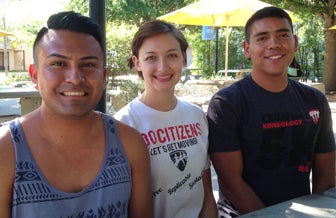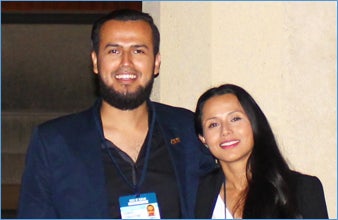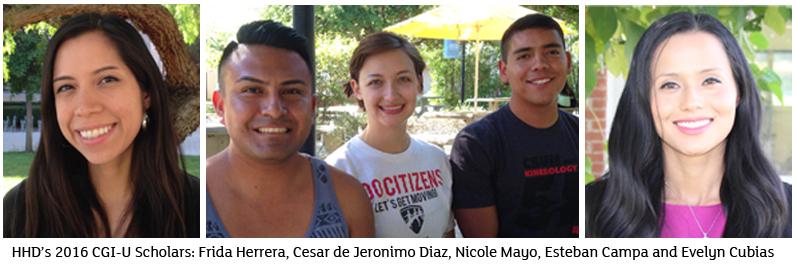Of the 1,200 students from around the world who attended the ninth annual meeting of the Clinton Global Initiative-University (CGI-U) at UC Berkeley in April, an even dozen were from CSUN. Of that 12, five were from HHD.
The CGI-U is a call to action for students to meet the challenges that come with global interdependence. Each student who applied submitted a “Commitment to Action” in one of five areas: Education, Environment and Climate Change, Poverty Alleviation, Public Health; and Peace and Human Rights. There is no charge for attendance, but the process is competitive and not all who apply are accepted.
Student success is CSUN’s number one priority, and participation in the CGI-U is a powerful step for our students to take. With this action, they are operating at the global level. The initiative also improves the visibility and reputation of the university and supports priorities for increasing research and involvement in sponsored programs.
We are proud of our CGI-U students and would like to introduce them to you and tell you about their projects and insights from the conference.
The Full Story: HHD and the Clinton Global Initiative University Program
Student success is CSUN’s number one priority, so President Dianne F. Harrison seized the opportunity for students to participate in the Clinton Global Initiative-University (CGI-U) program. Harrison appointed Dean Elizabeth Say (Humanities) to serve as the campus coordinator for the CGI-U effort. In consultation with other administrators, Say selected a faculty mentor for the students, Kenneth Luna, Assistant Professor of Spanish and Linguistics, College of Humanities.
“The purpose of the initiative is to get students to commit to actions that can bring about sustainable, positive change and help humanity on a global level,” Luna said.
“CSUN is a network member institution which means we committed funding to the CGI-U. As part of the membership, CGI-U promises one student will be accepted into the program. But, twelve of our students were accepted, and approximately thirty had the confidence to apply,” he said. “CGI-U is teaching entrepreneurship. Students are in charge. Faculty help them learn to pace themselves, but we are not managing them,” Luna added that as the campus mentor it was his job to helps students through the logistics of the application process and writing their commitments-to-action and to help students stay on track by reporting to him every couple of weeks.
Meet the HHD CGI-U Participants
 Frida Herrera, Nutrition, Dietetics and Food Science (Family & Consumer Sciences)
Frida Herrera, Nutrition, Dietetics and Food Science (Family & Consumer Sciences)
Winner: CGI Resolution Fellowship for her community-based gardening initiative, Let’s Grow Healthy.
The Quick View:
By engaging children and families in the process of growing, harvesting and preparing healthful foods, the project is countering the childhood obesity epidemic. Herrera is establishing gardens and education sessions in Canoga Park through the Marilyn Magaram Center for Food Science, Nutrition and Dietetics and the Institute for Community Health and Wellbeing. The $5,000 CGI-U grant and fellowship will allow her to develop and expand the project to develop the program in several additional schools.
Frida Herrera is a junior majoring in Family and Consumer Sciences (FCS)/Nutrition and Dietetics and Food Science. Now in her second year of the program, she works as a Research Assistant with the Marilyn Magaram Center (MMC) for Food Science, Nutrition & Dietetics. She is a CSUN BUILD/PODER scholar studying the effects of school gardening projects on children’s healthy eating habits. She is also historian for the Student Dietetics and Food Science Association (SDFSA) and serves as secretary for the Food Recovery Network at CSUN.
Herrera said the inspiration for her CGI U* project, Let’s Grow Healthy, came from her work with gardening and children. In partnership with CSUN Institute for Community Health and Wellbeing, she plans to develop new school gardens in the Canoga Park area. “I met ten year olds who had never tasted a radish,” she said. “When they discover that they can grow something from a seed, water it, harvest and eat it, they are so excited.”
At the CGI U competition, Herrera presented her project to The Resolution Project judges and other students. Then, along with about 130 other participants, she waited two hours for the panel of judges to make their decision. “It was a rollercoaster of a weekend,” she said. “Then I got the message: ‘Congratulations!’ You are a Resolution Fellow!’ and an award of $5,000 to expand Let’s Grow Healthy.” The fellowship comes with lifelong mentorship, sponsorship, networking, and workshops.
Herrera has already gained the support of community partners, including American Heart Association, and is planning to bring the program to five school gardens in Canoga Park. In addition, this program will benefit CSUN students by giving the opportunity to serve our community. “The project also supports sustainable internship hours for other students,” she said.
She cites the support of her faculty mentor, Dr. Annette Besnilian who encouraged her to dream big and submit the proposal. What’s next? “We’re planning a Food Science garden for the courtyard of Sequoia Hall. The garden will be science research lab in which we can evaluate what works and how we’re doing. For our Food Science students, we’re already thinking about developing our own CSUN products. How about offering our own ‘Spicy Matador seasoning’ at the Farmers Market?” she suggested. Read about Frida and the other CGI-U scholars from throughout CSUN in CSUN Today.

Cesar De Jeronimo Diaz (Kinesiology)
Nicole Mayo (Kinesiology)
Esteban Campa (Kinesiology)
Supported project: 100 Citizens Healthy You
The Quick View:
Each team member is playing a role in expanding the existing 100 Citizens community activity program with the goal of training instructors, providing resources, making it self-sustaining and spreading it throughout the CSU. By making the program into a mobile, sustainable model, it can ultimately go global.
Cesar De Jeronimo Diaz, Nicole Mayo and Esteban Campa attended CGI-U to get support to develop the skills to further develop the program, 100 Citizens Healthy You, which has its roots in the existing 100 Citizens Activity Program currently being implemented in several parks in the Los Angeles area.**
The team’s plan for 100 Citizens Healthy America is to spread the teaching model throughout the CSU by developing, recruiting, and train fellow kinesiology students, thus empowering others to continue the project after the team graduates. Ultimately, they want the program to go mobile and global as a self-sustaining entity. Since CGI-U, the team has invited people from all of the universities in the CSU to attend an expansion workshop and they have recently launched a crowdfunding campaign online. Each member of the team has a critical role in the development of the program.
Cesar De Jeronimo Diaz has the overview and drives the project forward. He first heard about the CGI-U from his advisor, Maria Elena Zavala (Biology) and so he approached Kinesiology faculty Steven Loy and asked if he thought they could make a go of it at CGI-U by broadening 100 Citizens. “This is a student driven and it’s meant to be handed down to new students coming in,” De Jeronimo Diaz said. “After we graduate it will keep going.”
De Jeronimo Diaz was a CSUN Presidential Scholar for 2014-15. Back then, he established a kinesiology outreach program for local community colleges, creating a model that informs students on the field of kinesiology. He is an undergraduate taking what he learned from the experience and applying it to the shape and structure of 100 Citizens Healthy America.
Esteban Campa oversees and customizes each chapter of the program for the social group it engages. Specifically, he manages all programs in the context of the parks and facilities, student development, and local park community engagement. “We have found that different socio-economic groups come to 100 Citizens for different reasons. In under-served areas, people come for the social connection and to know someone cares about them. In communities where people are financially better off, they come looking for both the healthier lifestyle and social interaction components of the program.” Experience with 100 Citizens at the parks has confirmed the team’s belief that that through diet and exercise people can take responsibility for their own health and educate the next generation.
At CGI-U the team saw reactions that were a little puzzling. “A few people weren’t sure what we were doing at a global summit,” Campa said. “But if I asked you whether the world could be improved through diet and exercise, would you say that it could?” The passion in his voice conveyed the affirmative. “Of course it could. Through diet and activity, we can stop the epidemic of obesity, help people avoid complications like heart disease, stroke and diabetes. Through physical activity we are changing minds and that is very important.”
Nicole Mayo keeps participants connected to the program with her understanding of multiple aspects of personality and motivation. She has created a curriculum for a weight loss program and oversees its implementation across the parks. “I created Healthy You for my Master’s thesis. I go to each of the parks to provide feedback and instruction to the 100 Citizens instructors,” she said. “And I’m helping participants track weight loss and stay compliant with their programs.”
“Going to CGI-U was inspiring,” Mayo said. “It was great being with like-minded people from all over the world. We developed new leadership skills and discovered new motivation. We had a lot of influential people who spoke about overcoming failure. It has always motivated me to see someone who, at one point, maybe they were lost—but who kept going until they found success. That resonated with me because as Esteban says, it’s sometimes difficult for others to see how an activity program, can change the world, but we are doing something that’s really important to our communities.”
 Evelyn Cubias (Public Health)
Evelyn Cubias (Public Health)
Samuel Cubias (Theatre)
Supported project: Eliminating Diabetes Complications and Death
The Quick View:
This sister and brother team is combining skills and talents to save lives through a health education program that teaches people in low income communities how to prevent and manage diabetes through a whole-person educational approach.
Master of Public Health student Evelyn Cubias is providing life-saving education. She is working across disciplines with her brother, Theatre major Samuel Cambia. “Our grandmother and our aunt in El Salvador both died from complications of diabetes because they didn’t understand the disease. In their communities, no one talked about it,” Evelyn Cubias said. “In contrast, our mother, who was also diagnosed with diabetes has inspired us because she is in control after obtaining knowledge through self-management education and complying with medical instructions.”
“I realized that even in California, there are a lot of people, especially those in lower socio-economic communities, who aren’t getting the information they need to stay healthy.” With their family members on their minds, the Cubias wrote their application to the CGI-U with the hope of creating a social change. “Because of the CGI-U, we are empowered to get the word out and implement the first Optimum Health pilot diabetes workshops. You can have a great program but if no one knows about it, it most likely won’t work,” Evelyn Cubias said.
“Samuel is brilliant and has such great ideas. He has always had a mentality of helping the community. We especially want to help people get in control of glycemic levels through diet and exercise. We are planning to bring health awareness to a demographic population with pre-diabetes, diabetes type 2 and even diabetes type 1 which is less common, but can still occur as in the example of one of my favorite examples is a friend of mine who has type one and has required insulin all her life. She manages the illness through diet and exercise, and she’s healthy. People need to know they can do this--but that’s not enough. They also need to be encouraged.”
Last year, Evelyn Cubias was taking a curriculum development course with faculty Petronella Montante (College of Education) and as a final project, she worked on creating a diabetes curriculum. “After my proposal presentation, my professor suggested I develop it into an application for a grant. I knew I would like to implement it, but I didn’t know when or how. When I heard of the CGI application, I was astonished that the vision for Optimum Health would fit so perfectly into a commitment to action,” she said.
“Evelyn talked to me about the idea,” Samuel Cubias said, “We realized that we could take the curriculum into the communities that need it most.” The model is called Optimum Health and has four components that address Diet, Physical Activity, Emotional /Mental Health & Spirituality. In the Cubias will integrate Samuel’s experience as a Theatre major to create a performance piece.
“We are in contact with a few churches right now and they have expressed they are very exited to be able to learn about self-management of diabetes for prevention and control. I have worked with self-management education models and most of them include diet, physical activity and emotional health, but they lack a very important component that deals with the individuals’ spiritual/soul nature. The focus of my curriculum development and a main difference of the project is the spiritual component because I have seen the need for it and we would like to provide the space and safety to freely talk about the participant’s interest on this specific topic and how this affects their lives.” Evelyn Cubias said.
“But we are also considering people who aren’t religious/ spiritual,” Samuel Cubias said, “We’re structuring it so that the basis is in a sense of encouragement.”
“We want people to explore their circumstances, understand their health in the context of the ways they live and their relationship to their communities and themselves, “Evelyn Cubias said. “We also want them to talk about their experiences and learn from each other.”
At the CGI-U, Evelyn and Samuel were both impressed by the community they found there. “The panel of speakers were so motivating. The thing I really saw is they don’t have everything figured out either. In the case of diabetes self-management, you might not see progress right away. But I’ve seen results in my work experience as a diabetes facilitator. I’ve had participants in my workshops whose A1C levels have dropped, people who are no longer pre-diabetic because they have changed their lifestyles to healthier ones. This work is very essential and rewarding. We are inspired by CGI-U and we are excited about what we can do next.”
Kenneth Luna summed up the CGI-U experience like this: “It’s amazing what students can do. We live with so much pessimism but there are people who care and are empowered to change things. The CGI-U experience reminds me there is hope for humanity.”
The Clinton Global Initiative was established in 2005 by President Bill Clinton. It convenes global leaders to create and implement innovative solutions to the world’s most pressing challenges. The Clinton Global Initiative University was launched in 2007 as a way of engaging the next generation of leaders on college campuses around the world. Today, there are more than 280 Resolution Fellows on six continents working on ventures addressing issues ranging from basic needs, food, development, education, energy and the environment, health and wellness, equality and empowerment and humanitarian relief. – CSUN Today
*Herrera is also an officer for the Food Recovery Network at CSUN. Left-over food that has not been sold via CSUN Dining and Freudian Sip, and which would otherwise have gone into the to trash, is now saved and taken to local shelters. The project was established in the fall 2015 semester and since then the organization has recovered over 2,000 pounds edible food.
** 100 Citizens is being implemented in the San Fernando Valley: Recreation Park in San Fernando; Crescenta Valley Community Regional Park, La Crescenta; El Cariso park in Sylmar; and Lanark park Canoga Park as well as Helen Keller and Martin Luther King Jr. Parks in South Los Angeles.
Sp2016
Jean O'Sullivan

